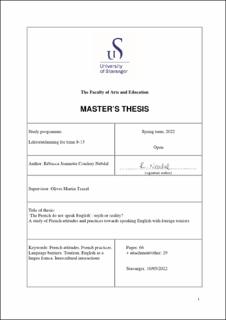| dc.description.abstract | The main purpose of this thesis is to investigate the practices and attitudes of the French when questioned by foreign tourists in English. In addition, it explores to what extent the French understand foreign tourists who address them in English and make themselves understood when they respond to them. Lastly, it also considers any correlations between the French’s responses when addressed by foreign tourists in English and their socio-demographic background and English proficiency.
In order to achieve these aims, a multiple method was conducted during the winter of 2021/2022 in Paris. Two quantitative research techniques were combined alternately to gather as much and various data as possible. Thus, structured interviews were carried out among 206 respondents first, and a new sample of 280 participants was observed thereafter. The interviews focused on the attitudes of the French when addressed in English by foreign tourists, while the observations concentrated on their practices. Hence, questions from the interview guide regarded the French’s feelings, opinions and thoughts when asked in English by tourists, whereas the observations were concerned with the response (e.g. the willingness to help, the language used, and the accuracy of the answer). The observations necessitated the help of an external person, i.e. a non-native speaker of French and English, who posed as a foreign tourist together with the researcher. The non-native speaker was the one to question the French participants in English and the researcher took notes of the observations.
The collected data shows that the majority of the French stop and attempt to help foreign tourists who speak English. Nevertheless, a few of them answer solely in French and some mix English and French in their reply. This indicates that not all of the responses the French provide to foreign tourists are understandable. Approximately a fifth of the responses the French give to foreign tourists are incomprehensible, another fifth are comprehensible from a little to a moderate extent, and a half are comprehensible from a large to a very large extent. As regards the understanding of the requests expressed by foreign tourists in English, many French are able to understand them from a moderate to a very large extent, and it seems that the rest, who cannot understand, manage to guess the meaning of the requests due to context. Furthermore, the findings reveal that most of the French have positive attitudes towards speaking English with foreign tourists; they frequently feel helpful and often interested. However, the results also show that a few French experience embarrassment, nervousness and shyness when interacting in English with foreign tourists, feelings that are barely present when the tourists can speak French. Moreover, the collected data suggests that the variables of age, educational background and notably the level of English proficiency have an influence on the French’s practices and attitudes towards interacting in English with foreign tourists. | |
